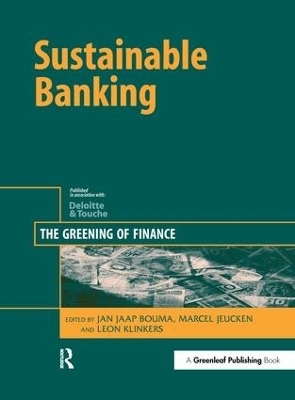
Sustainable Banking
Greenleaf Publishing (Verlag)
978-1-874719-38-0 (ISBN)
This comprehensive addition to the debate on sustainable development has been produced in order to take a global pulse on how the financial services sector is responding to the growing challenge of shareholder and stakeholder expectations on social and environmental performance. In the opinion of many commentators in this new book, given the intermediary role banks play within economies, their potential contribution toward sustainable development is enormous. Indeed, for banks, the conclusion that corporate sustainability has become an investable concept that increases long-term shareholder value is becoming difficult to deny.To date, banks have been relatively slow to examine their exposure to risk (the environmental and social performance of their clients) and the business opportunities of sustainable development (the products and services they offer). Not before time, Sustainable Banking concludes that this is beginning to change, with both risk and opportunity becoming established elements in banking policies towards environmental sustainability. In addition, banks have now begun to take notice of and address their own environmental performance. Through the use of case studies and detailed analysis, the book examines the environmental policies of banks, the importance of transparency and communication with their stakeholders, environmental and ethical investment funds, current practice by the providers of financial services with regard to environmental risk management and, finally, the key role of government, NGOs and multilateral banks in delivering sustainability.Sustainable banking has not, however, been achieved and nor will it be in the immediate future. As globalisation proceeds apace, Sustainable Banking argues that improvements are necessary in banks' attitudes toward transparency and accountability with regard to their lending policies. In addition, in order to promote best practice, the leading banks need to start measuring their customers' environmental performance in order to persuade polluting clients that minimum compliance to regulations will no longer suffice. The book finds many shining examples in the co-operative, mutual and social sectors for the big players to emulate. Environmental and ethical considerations in such loan portfolios have proven to be profitable and "best-in-class" larger banks are now also reaping benefits.The unprecedented scope of the book has attracted contributors from four continents including Deloitte & Touche, Rabobank, The World Bank, The European Bank for Reconstruction and Development, The United Nations Environment Programme, The World Business Council for Sustainable Development, UBS, Henderson Investors, KPMG, The World Resources Institute and SAM Sustainability.
Lawrence I. Conrad, Dominik Wujastyk
ForewordHans N.J. Smits, Chairman of the Executive Board, Rabobank NederlandForewordPreben Sørensen, Global Director, Environment and Sustainability, Deloitte & ToucheIntroductionJan Jaap Bouma, Erasmus University, Netherlands, Marcel Jeucken, Rabobank, Netherlands, and Leon Klinkers, Deloitte & Touche, Netherlands1. The changing environment of banksMarcel Jeucken, Rabobank, Netherlands, and Jan Jaap Bouma, Erasmus University, NetherlandsPart I: The environmental policies of banks2. Sustainable banking at UBSHeinrich Hugenschmidt, UBS AG, Switzerland, Josef Janssen, Institute for Economy and the Environment, University of St Gallen, Switzerland, and Yann Kermode and Inge Schumacher, UBS AG, Switzerland3. A green package to promote environmental management systems among SMEsDavide Dal Maso, Avanzi, Italy, and Carlo Marini and Paola Perin, Unicredito Italiano4. Sustainable banking and the ASN BankMichel Negenman, ASN Bank, Netherlands5. Assessing the sustainability of bank service channels: the case of The Co-operative BankPenny Street and Philip E. Monaghan, National Centre for Business and Sustainability, Manchester, UK6. Grameen Shakti: financing renewable energy in BangladeshFiroze A. Siddiqui and Peter Newman, Murdoch University, Perth, Australia7. Assessing the "triple bottom line": social and environmental practices in the European banking sectorJames Giuseppi, Henderson Global Investors, UK8. Sustainable banking in AustriaChristine Jasch, Institute for Environmental Management and Economics (IOeW), Austria9. Environmental attitudes of banks and financial institutionsJudit Barta, GKI Economic Research Co., Hungary, and Vilma Eri, Centre for Environmental Studies, Hungary10. Banks and environmental practices in Bangkok Metropolitan Region: the need for changeWilli Zimmermann and Beatriz Mayer, Asian Institute of Technology, ThailandPart II: Transparency and communication11. Reporting on the environment: current practice in the financial services sectorKaisa Tarna, KPMG, Finland12. Making the link between environmental performance and shareholder value: the metrics of eco-efficiencyBjörn Stigson, President, World Business Council for Sustainable Development, Switzerland13. Transparency and the green investment marketWalter Kahlenborn, Ecologic, Germany14. The corporate environmental performance-financial performance link: implications for ethical investmentsCeline Louche, Erasmus University, NetherlandsPart III: Sustainable investment funds15. Sustainable development funds: progress since the 1970sStefan Schaltegger, University of Lüneburg, Germany, and Frank Figge, University of Lueneburg, Germany/Pictet & Cie., Switzerland16. The transition from environmental funds to sustainable investment: the practical application of sustainability criteria in investment productsAndreas Knoerzer, Bank Sarasin & Co., Switzerland17. The Dow Jones Sustainability Group Index: the first worldwide sustainability indexAlois Flatz, Lena Serck-Hanssen and Erica Tucker-Bassin, SAM Sustainability Group, Switzerland18. The Green Fund System in the NetherlandsTheo van Bellegem, Ministry of Housing, Spatial Planning and the Environment, NetherlandsPart IV: Environmental risk and banks' products19. Providers of financial services and environmental risk management: current experienceAndrei D. Barannik, International EA Adviser, USA20. Environment-induced systematisation of economic risksFrank Figge, University of Lüneburg, Germany/Bank Pictet & Cie., Switzerland21. Estimating the financial effects of companies' environmental performance and exposureRobert Repetto and Duncan Austin, World Resources Institute, USA22. The Environment Handbook: a Danish tool for including environmental aspects in credit evaluationDan Atkins, Deloitte & Touche Environmental Services, Australia, and Charlotte Pedersen, Deloitte & Touche Environmental Services, Denmark23. Corporate environmental assessment by a bank lender: the realityAndrea B. Coulson, University of Strathclyde, UKPart V: The role of government, NGOs and multilateral banks24. The World Bank's environmental assessment policies: review of institutional developmentAndrei D. Barannik, International EA Adviser, USA, and Robert J.A. Goodland, The World Bank, USA25. International financial institutions and the Three Gorges hydroelectric power schemeKate Kearins and Greg O'Malley, University of Waikato, New Zealand26. The Hungarian Environmental Credit LineZsolt Pasztor, Deloitte & Touche, Hungary, and Denes Bulkai, European Bank for Reconstruction and Development27. The Growth and Environment Scheme: the EU, the financial sector and small and medium-sized enterprises as partners in promoting sustainabilityMarc Leistner, European Investment Fund, Luxembourg28. An environmental fund with the WWF label: the importance of appropriate communication toolsSabine Döbeli, Zuercher Kantonalbank, Switzerland29. The role of the United Nations Environment Programme and the financial services sectorMike Kelly, United Nations Environment Programme, Geneva, and Ari Huhtala, United Nations Environment Programme, France30. Directing investment to cleaner energy technologies: the role of financial institutionsNorbert Wohlgemuth, UNEP Collaborating Centre on Energy and Environment, Denmark31. Sustainable finance for sustainable energy: the role of financial intermediariesGlenn Stuart Hodes, Princeton University, USA32. Can financial institutions contribute to sustainability?Stephen Viederman, Former President, Jessie Smith Noyes FoundationBibliography
| Erscheint lt. Verlag | 1.3.2001 |
|---|---|
| Verlagsort | Saltaire |
| Sprache | englisch |
| Maße | 156 x 234 mm |
| Gewicht | 480 g |
| Themenwelt | Naturwissenschaften ► Biologie ► Ökologie / Naturschutz |
| Wirtschaft ► Betriebswirtschaft / Management ► Finanzierung | |
| Betriebswirtschaft / Management ► Spezielle Betriebswirtschaftslehre ► Bankbetriebslehre | |
| ISBN-10 | 1-874719-38-1 / 1874719381 |
| ISBN-13 | 978-1-874719-38-0 / 9781874719380 |
| Zustand | Neuware |
| Haben Sie eine Frage zum Produkt? |
aus dem Bereich


